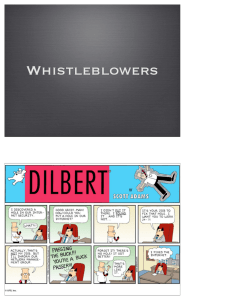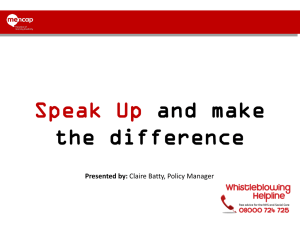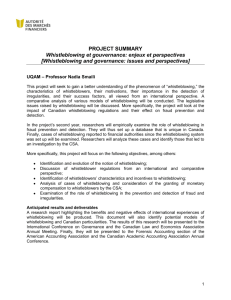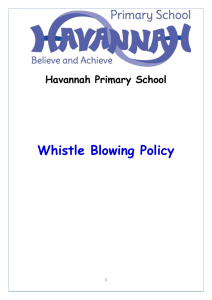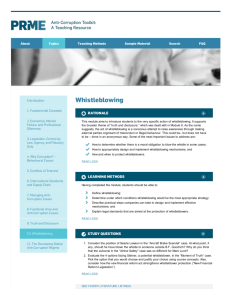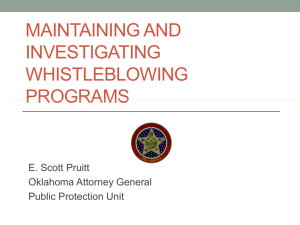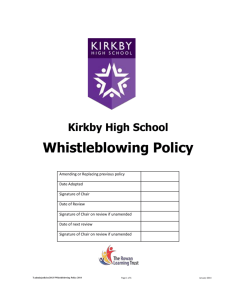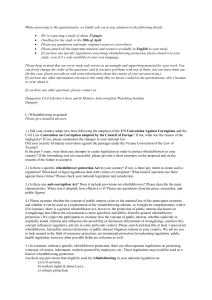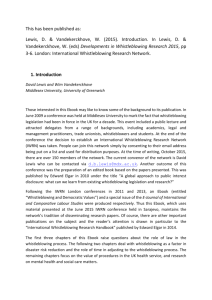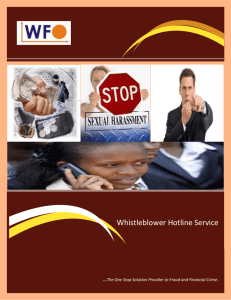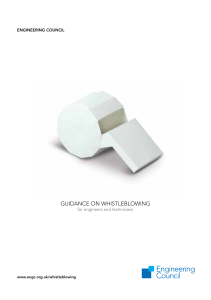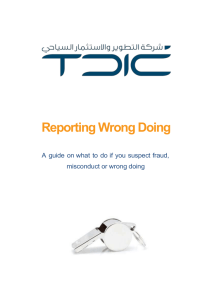Whistleblowers
advertisement
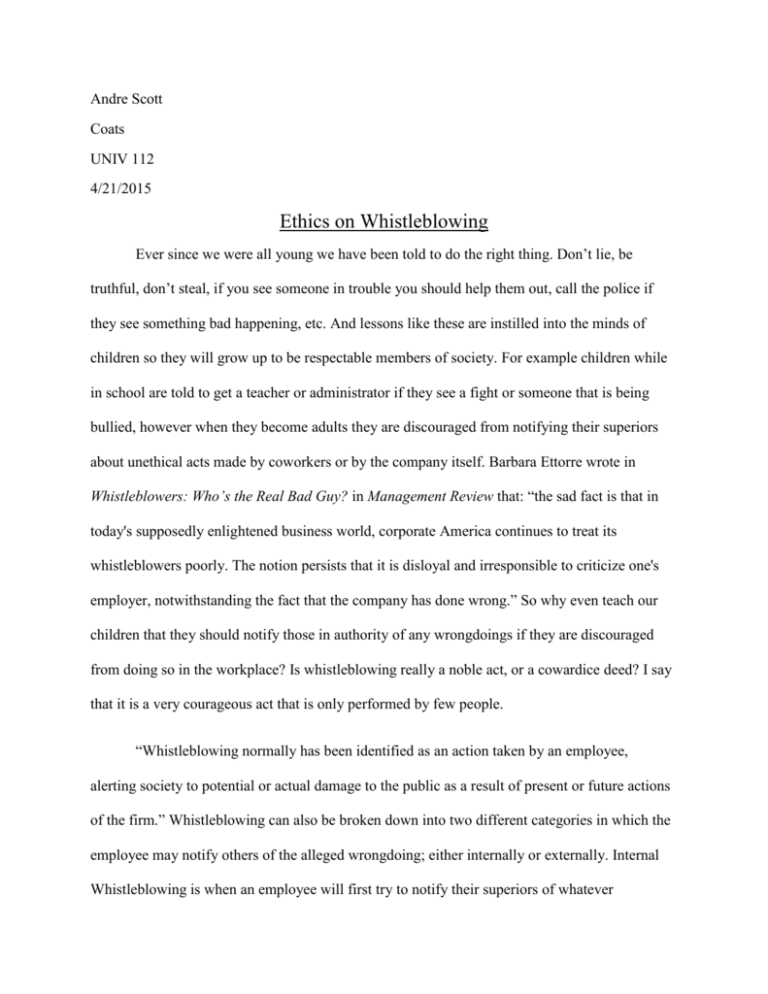
Andre Scott Coats UNIV 112 4/21/2015 Ethics on Whistleblowing Ever since we were all young we have been told to do the right thing. Don’t lie, be truthful, don’t steal, if you see someone in trouble you should help them out, call the police if they see something bad happening, etc. And lessons like these are instilled into the minds of children so they will grow up to be respectable members of society. For example children while in school are told to get a teacher or administrator if they see a fight or someone that is being bullied, however when they become adults they are discouraged from notifying their superiors about unethical acts made by coworkers or by the company itself. Barbara Ettorre wrote in Whistleblowers: Who’s the Real Bad Guy? in Management Review that: “the sad fact is that in today's supposedly enlightened business world, corporate America continues to treat its whistleblowers poorly. The notion persists that it is disloyal and irresponsible to criticize one's employer, notwithstanding the fact that the company has done wrong.” So why even teach our children that they should notify those in authority of any wrongdoings if they are discouraged from doing so in the workplace? Is whistleblowing really a noble act, or a cowardice deed? I say that it is a very courageous act that is only performed by few people. “Whistleblowing normally has been identified as an action taken by an employee, alerting society to potential or actual damage to the public as a result of present or future actions of the firm.” Whistleblowing can also be broken down into two different categories in which the employee may notify others of the alleged wrongdoing; either internally or externally. Internal Whistleblowing is when an employee will first try to notify their superiors of whatever wrongdoing is occurring. The employee will follow the proper channels to notify the upper management in order for their complaint to be heard. External Whistleblowing is when an employee will notify the media, public interest groups, or regulatory agencies rather than the management of the firm they work for. An employee will sometimes try to go through the proper channels in their whistleblowing first before externally whistleblowing, in these cases there are laws that can protect the employee from unlawful termination; however not all states have laws that will protect the employee. There are federal laws that can protect government employees, however they require employees to go through the proper channels through the chain of command, otherwise that employee can face charges. Whistleblowing is a moral action used by those with the courage to stand up for what is right and for what is just. However there are those who see whistleblowing as a disloyal act made by cowards. To those that hold this belief I respect you in having a right to your own opinion, but I do believe that someone who is risking their employment, possible criminal charges, or possible blackballing is neither a coward nor a disloyal person. And this is where the debate comes in; is whistleblowing disloyalty or is it heroism? It comes down to the conflict of remaining loyal to one’s firm and the liberty to speak out against wrongdoing. Well according to Ronald Duska, business ethics consultant, he believes that no one owes a firm any sort of loyalty. He doesn’t even believe in any moral dilemma for whistleblowing because “one does not have an obligation of loyalty to a company, even a prima facie one, because companies are not the kinds of things that properly objects of loyalty.” He says essentially that only humans are the only “objects” that deserve any sort of loyalty. To me this means that it is the people, or society, who deserves to be thought about first when it comes to the conflict of whistleblowing, not the company someone works for. Let’s say for example a big industrial company is secretly dumping waste against regulations and the waste is getting into the local ground water and contaminating the water supply, and an employee of said company finds out and has a moral problem against the dumping. Then said employee tells their supervisors of the dumping and their concerns for public safety, the supervisors dismiss the employee’s concerns and tells them to leave it alone. Now this employee has two choices; either they keep quiet and allow the dumping to continue, or they can notify the proper authorities and let them take over. If the employee allows the dumping to continue they will be going against their own personal morals and allowing illegal activity to be going on that is a possible health risk to the local population and the environment. And if they notify the proper authorities they could possibly be fired from their position, thus losing their income and livelihood. I believe that this employee should notify the proper regulation authorities or the police despite the risk of possible employment termination. It is for the greater good of the public and the environment that the wrongdoings by the company in the example be brought to the public eye and dealt with. Having the courage to stand up for what is right for the people in your society is not cowardice. I also feel that Peter Singer would agree with the employee in the example’s decision if they had chosen to blow the whistle. Singer believes in a global community where we need to look out for each other. This, to me, says that our loyalties should be to the people in our societies, not to big corporations. Whistleblowers are not bad people and they surely are not bad employees, and the notion that they are bad employees needs to end. Ettorre said that, “Discussions with experts, advocates, human resource professionals and public interest groups about how organizations treat employee whistleblowers illuminate a dismal picture. Other than outright dismissal, retaliation can and does include demotion, false complaints about job performance, reassignment and relocation, assignment of unsympathetic coworkers or supervisors and otherwise making the job difficult, withholding of pension, orders to undergo psychological examination, investigation of finances and personal life, and harassment of family and friends.” Perhaps companies could encourage their employees to come forward about any wrongdoings they see, such as the situation stated earlier. Maybe if that company had been encouraging its employees to come forward about wrongdoings they wouldn’t have dismissed the employee in the example’s claims so easily. Employees should also receive more legal support in case they do decide to blow the whistle on the company they work for. Ettorre continues to say, “Mistreated employees have legal avenues for redress, although many of these laws are enforced by the same systems in which the charges originated. Nevertheless, there are signs that whistleblowers will be afforded some protection from employer reprisals. One of the biggest stumbling blocks has been that whistleblower protection laws have evolved inconsistently. GAP's Adam Devine says, ‘with or without legal changes, it is a fact of life that when you bite the hand that feeds you, it tends to slap you, at the least.’” Currently all states and the District of Columbia have laws that protect public employees from retaliation from their employer in case of any sort of proven whistleblowing of any illegal wrongdoing. However most of these laws protect public employees only, while a few states protect both public and state employees; although there are federal laws that do protect all state employees. Whistleblowing is something that needs to be encouraged by employers in order to keep a good work environment. It will show the employees that the company needs them to help keep the company honest. To keep them in line and make sure the work environment and actions by the company are kept to a certain standard that is ethical and legal. Whistleblowers are simply moderators who, at times, risk their jobs in order to make sure the company they work for is one that follows the law and provides a good work environment. Citations Ettorre, B. (1994). Whistleblowers: Who's the real bad guy? Management Review, 83. Heacock, M., & McGee, G. (1987). Whistleblowing: An Ethical Issue in Organizational and Human Behavior. Business & Professional Ethics Journal, 6(4), 35-46. Lindblom, L. (2007). Dissolving the Moral Dilemma of Whistleblowing. Journal of Business Ethics, 76(4), 413-426. National Whistleblowers Center. (n.d.). Retrieved April 22, 2015.
